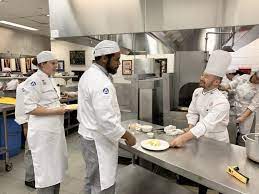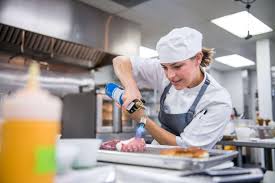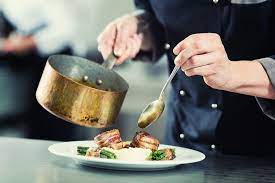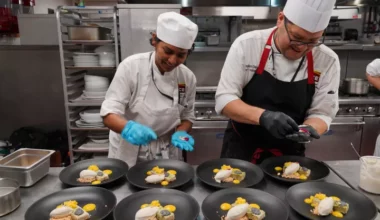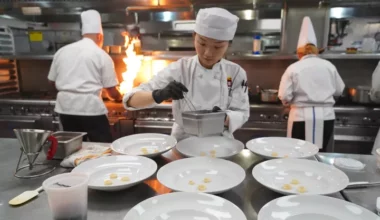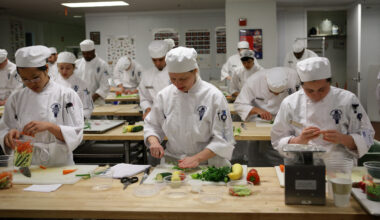China, a country known for its rich culinary traditions and diverse food culture, has become a popular destination for international students looking to pursue a culinary education. The global culinary revolution has propelled China’s culinary industry to the forefront, making it an enticing choice for aspiring chefs and culinary professionals.
In this comprehensive guide, we will explore the benefits of studying culinary arts in China as an international student and provide a step-by-step roadmap on how to successfully apply to culinary schools in this captivating country.
Table of Contents
Researching Culinary Schools in China
Before you can start your application process, it’s essential to research and select the culinary school that aligns with your career goals and preferences.
Factors to Consider
1. Accreditation and recognition:
It is crucial to choose a culinary school that is accredited and recognized by reputable culinary organizations and industry professionals. This ensures that the education received is of high quality and meets industry standards.
2. Specializations and programs offered:
Different culinary schools in China offer a variety of specializations and programs. Whether you have a specific interest in Chinese cuisine, pastry arts, or culinary management, it is important to choose a school that aligns with your career goals and interests.
3. Faculty and industry connections:
The expertise and experience of the faculty members play a significant role in the quality of education. Look for culinary schools that boast renowned chefs and instructors who have strong connections with the industry, as this can provide valuable networking opportunities and career guidance.
4. Language requirements and support:
Considering that the medium of instruction in most culinary schools in China is Mandarin Chinese, international students should assess their language proficiency and evaluate if the school offers language support and Mandarin classes for non-native speakers.
5. Location and cultural immersion opportunities:
China is a vast country with diverse culinary traditions. Choosing a culinary school in a specific region can provide opportunities for cultural immersion and a deeper understanding of local cuisines. Consider the location of the school and the culinary traditions associated with that region.
Understanding the Application Process
Applying to culinary schools in China requires careful preparation and attention to detail. Here is a step-by-step guide to help international students navigate the application process smoothly:
1. Preparing the Application Documents:
Gather all the required documents, such as academic transcripts, letters of recommendation, a well-crafted statement of purpose, and any additional materials specified by the culinary schools.
2. Transcripts and Language Proficiency Tests:
Submit your academic transcripts, translated into Mandarin if necessary, and provide proof of language proficiency through tests like the HSK (Hanyu Shuiping Kaoshi) or TOEFL (Test of English as a Foreign Language).
3. Crafting a Compelling Statement of Purpose:
Write a thoughtful and engaging statement of purpose that showcases your passion for culinary arts, your career goals, and why you have chosen to study in China specifically. Highlight any relevant work experience or skills that make you a strong candidate.
4. Obtaining Letters of Recommendation:
Request letters of recommendation from teachers, professors, or employers who can attest to your skills, abilities, and potential as a culinary student.
5. Scholarships and Financial Aid Options:
Explore scholarship opportunities and financial aid options specifically available to international students studying culinary arts in China. Research organizations, institutions, or governmental programs that provide financial support for international students.
Navigating Visa and Legal Requirements
For international students planning to study culinary arts in China, it is essential to understand the visa and legal requirements to avoid any complications. Here are some key necessities to keep in mind:
- Student Visas and Permits: Obtain the necessary student visa (X Visa) from the Chinese embassy or consulate in your home country. Ensure that you have all the required documents, including the acceptance letter from the culinary school, proof of financial resources, and a valid passport.
- Health Insurance and Medical Requirements: International students are typically required to have health insurance coverage while studying in China. Check with the culinary school and inquire about any specific medical requirements or vaccinations needed before entering the country.
- Legal Considerations and Restrictions: Familiarize yourself with the local laws and regulations that may apply to international students. Understand the rules regarding work permits, length of stay, and any restrictions that may affect your culinary education journey in China.
Living and Adaptation for International Students
Adjusting to life in China can be an exciting yet challenging experience for international culinary students. Here are some tips to help you adapt and thrive:
Cultural norms and etiquette:
Take the time to learn about Chinese culture, traditions, and social etiquette. Respect local customs, practices, and values to foster positive interactions and build meaningful relationships.
Housing options and student accommodations:
Many culinary schools in China provide on-campus or off-campus housing options for international students. Explore the various accommodation choices and find one that suits your preferences and budget.
Language learning resources:
Immerse yourself in learning Mandarin Chinese, as it will greatly enhance your culinary education and daily life in China. Utilize language learning resources, such as language exchange programs, apps, or language courses offered by the culinary school.
Navigating the local cuisine:
China’s culinary landscape is incredibly diverse, with a wide range of regional cuisines and flavors. Embrace the opportunity to explore and taste the local cuisine, trying dishes from different provinces to expand your culinary knowledge and palate.
Understanding the Culinary Education System in China
The culinary education system in China is highly regarded and offers a unique blend of traditional techniques and modern culinary innovations. Here are some key aspects to understand:
Traditional Chinese culinary techniques and philosophies:
Chinese culinary arts have a rich history and are deeply rooted in tradition. In culinary schools, students will have the chance to learn traditional techniques, such as stir-frying, steaming, and roasting, while also exploring the cultural and philosophical aspects of Chinese cuisine.
- Balancing theoretical and practical learning: Culinary schools in China strive to strike a balance between theoretical knowledge and hands-on practical training. Students can expect a combination of classroom lectures, kitchen labs, and practical experiences to develop their culinary skills.
- Professional certifications and opportunities for growth: Graduating from a culinary school in China can open doors to various professional certifications and opportunities for growth. Look for schools that offer industry-recognized certifications or have partnerships with renowned culinary institutions.
Financing Your Culinary Education
Finances are an important aspect to consider when planning to study culinary arts in China. Here are some avenues to explore:
- Tuition fees and cost of living: Research and compare the tuition fees of different culinary schools in China, taking into account the duration of the program and any additional expenses. Additionally, consider the cost of living in the chosen city or region.
- Scholarships, grants, and fellowships: Investigate scholarship programs and grants specifically designed for international culinary students in China. Many organizations, culinary associations, and educational institutions offer financial assistance to talented students.
- Part-time job opportunities: Some culinary schools in China permit international students to work part-time while studying. Explore opportunities within the campus or nearby establishments to supplement your income and gain practical experience.
Internship and Job Placement Opportunities
Securing internships and building a strong professional network is crucial for success in the culinary industry. Here are some avenues to consider:
Internship programs and industry partnerships:
Culinary schools in China often have established internship programs and partnerships with local restaurants, hotels, or catering companies. Take advantage of these opportunities to gain practical experience and enhance your resume.
Developing culinary networks:
Attend culinary events, workshops, and seminars to network with industry professionals and fellow culinary students. Building connections can open doors to job opportunities and mentorship.
Job placement support upon graduation:
Inquire about the job placement support provided by the culinary school. Some schools have dedicated career service departments that assist students in finding employment opportunities post-graduation.
Exploring Culinary Cultures across China
China is a vast country with diverse regional culinary traditions. Here are some regions and their culinary specialties worth exploring:
- Sichuan cuisine: Known for its bold and fiery flavors, Sichuan cuisine offers a tantalizing experience for adventurous palates. Explore numbingly spicy dishes like Mapo Tofu or the famous hot pot.
- Cantonese cuisine: Cantonese cuisine is renowned for its delicate flavors and emphasis on freshness. Indulge in dim sum, a Cantonese specialty that showcases a variety of bite-sized delicacies.
- Dongbei cuisine: Hailing from northeastern China, Dongbei cuisine is known for its hearty and comforting flavors. Try classic dishes like Guo Bao Rou (sweet and sour pork) and Nian Gao (sticky rice cake).
- Xinjiang cuisine: Situated in China’s far northwest, Xinjiang cuisine combines the flavors and spices of Central Asia with Chinese cooking techniques. Don’t miss out on trying dishes like Xinjiang-style lamb skewers and hand-pulled noodles.
Tips for a Successful Culinary School Application
To increase your chances of success, consider these dos and don’ts when applying to culinary schools in China:
- Highlighting relevant work experience and skills: Emphasize any previous culinary experiences, internships, or workshops you have participated in. Showcase your skills in the kitchen, such as knife techniques or pastry arts, to demonstrate your passion and dedication.
- Showcasing passion and dedication for culinary arts: Use your application materials to convey your genuine love for culinary arts. Talk about what inspires you, your goals, and how studying in China will contribute to your culinary journey.
- Tailoring application materials to each school: Take the time to research each culinary school and tailor your application materials accordingly. Show a genuine interest in the school’s programs, faculty, or unique strengths.
Frequently Asked Questions (FAQs)
Here are the answers to some frequently asked questions about applying to culinary schools in China:
Are there culinary schools in China that offer programs in English?
Yes, several culinary schools in China offer programs taught in English, catering to the international student community.
Can I work while studying at a culinary school in China as an international student?
Some culinary schools in China allow international students to work part-time on campus or secure internships in relevant culinary establishments.
How much does culinary school cost in China, and are there any scholarships available?
The cost of culinary school in China varies depending on the institution and program. Scholarships, grants, and fellowships are available to international students, so it is worth exploring financial aid options.
What are the language requirements for international students applying to culinary schools in China?
Language requirements vary between culinary schools, but most schools require international students to have a basic understanding of Mandarin Chinese or provide language support for non-native speakers.
Can international students take part in local culinary competitions and events?
Yes, international students are often encouraged to participate in local culinary competitions and events to showcase their skills and engage with the culinary community.
Conclusion
Embarking on a culinary education journey in China as an international student is an exciting and rewarding experience. By researching culinary schools, understanding the application process, navigating visa and legal requirements, adapting to life in China, embracing the culinary education system, and exploring the diverse culinary cultures of the country, you can pave your way to success and discover new horizons in the world of culinary arts.
So pack your bags, sharpen your knives, and get ready to dive into the wonders of China’s culinary scene.
